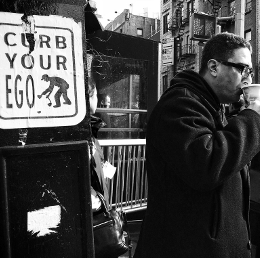
Photo Credit Ryan Vaarsi
I’ve noticed a good amount of people doing things that can hurt their SEO and it’s their ego making them do it.
Ego is defined as “a person’s sense of self-esteem or self-importance. AKA someone who is full of themselves.
Ego is not a bad thing. We need it to balance our ID or more instinctual impulses, but your ego can take over and get in the way of your instincts, your gut.
Now let’s find out what the heck I’m talking about.
Let’s use a real world example to start:
Say you want to ask a person on a date, but you’re shy. That is an example of your ego at play. Your instinct on a primal level is to mate or at least get a working phone number, but your ego starts to think of itself, yourself, and applies baggage and other data to make you nervous.
This is an example of your ego holding you back in the analog world. Now let’s look at how your ego effects your SEO strategy.
How You Handle Source Links
Say you find an article in your niche that you want to share on your websites blog. If you’ve ever omitted the source link, you’re ego got involved. If you’ve ever not actually hyper linked the source URL, your ego got involved. If you’ve ever flat out copied the content, your ego definitely got involved.
In this case your ego wanted to either take credit for the content or keep people from clicking off your website. The latter is more morally understandable, but either one will hurt your SEO.
How you may ask?
Well, the pitfalls of copying content should be obvious but in case you haven’t heard, Google and every other major search engine can detect duplicate content and will penalize your ranking if you use it on your site. Especially if you do it a lot.
The second one may not be so obvious. To answer that we’ll have to look at the first issue, duplicate content. If you don’t link to the original content you re-posted how is Google supposed to know if you are copying the content or syndicating it?
On top of that, Google LOVES it when you link to other authority sites. Remember that search engines want to give people the answers they are searching for, if you link to the same sites Google displays in top results, you increase your trust with them.
Other Examples of Your Ego Getting in the Way
Source links aren’t the only part of your SEO strategy that can be affected by your ego. I can’t tell you how many times I’ve first read a website’s content meant for their client’s, that gets far too technical for their end users. This is another example of ego getting involved. The authors main focus in this case has shifted from getting leads and ranking, to boasting about their knowledge level. Google likes content that is easily readable by the general public. If you put too much focus on trying to show that YOU understand your topic and not enough time showing your USER how to understand your topic, your Ego is getting involved.
Social signals are another part of SEO where your ego can easily get involved. Far too many new Facebook and Twitter page admins will buy fake likes and tweets, because they are deep down embarrassed that they have 0-low followers. Just how Google likes easily readable content, Facebook likes user engagement and measures it using their algorithm called EdgeRank. If the majority of your followers are fake, they won’t engage your content down the road, because….well… they don’t exist.
Conclusion
100% Organic/White Hat, SEO takes time and effort. Shortcuts like copying content and buying likes/shares may boost your ego in the short term, but they will never produce consistent and long term Google rankings.
Recent Comments